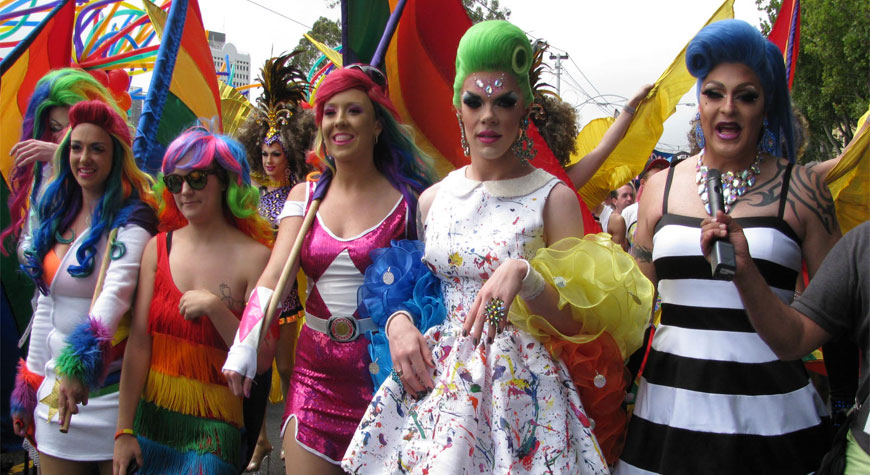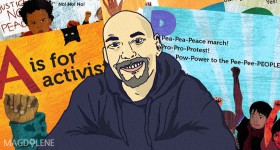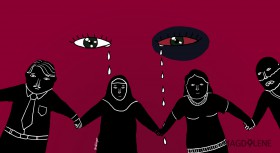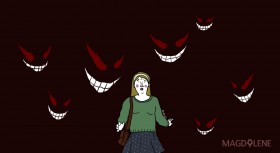“It gets better,” read posters carried by people rallying at Pride March in Melbourne on February 1. The march is an annual parade of lesbian, gay, bisexual, transgender and intersex (LGBTI) community that was part of the annual Queer Celebration of Midsumma Festival in the world’s most livable city.
For the LGBTI community that celebrated the event’s 20th anniversary this year, it has gotten progressively better in the past two decades. For the first time, the celebrated march was attended by Victoria State Premier Daniel Andrews, a huge milestone in the history of the Pride March in a country where same-sex sexual activity only became legal nationwide in the mid ‘90s.
On that overcast summer afternoon, Premier Andrews’ symbolic gesture to lead a diverse crowd comprising politicians, public servants, sports groups, schools and regional community groups was coupled with another huge milestone: the creation of Australia’s first ever Equality Minister in the state cabinet. The Premier assigned Martin Foley to the post to make sure that “every Victorian can feel safe and confident to be exactly who they are,” a bold political commitment that could make the LGBTI community in Indonesia green with envy. In his remark when opening the Festival in mid January, he also stressed that equality was not negotiable in Victoria.
On Sunday’s Pride March, about 40,000 people joined in, roaring with support from their balconies or lining up the streets of St Kilda, the home of Melbourne’s most famous beach. The enthusiastic crowd joined cheered and took pictures with their smartphone on selfie sticks, as transvestites dressed in colorful body hugging outfits and sparkly jewelries paraded the street. A group of policemen, ambulance crew and firemen also marched in their uniform, mingling with families pushing baby strollers, as well as footballers and rugby players in their jerseys. Rainbow flags were erected, and colorful outfits and accessories dominated the scene, making the celebration alive and happening.
Along with Mardi Grass in Sydney, the Midsumma Festival is claimed as one of the largest festivals celebrating queer arts and life in the world. Since 1988 Midsumma has drawn around 150,000 of people every year. The festival runs for three weeks starting mid January, with events and activities including visual art exhibitions, plays, spoken word performances, cabarets, movies, concerts, parties, sport events, and public lectures in Melbourne and some regional cities in Victoria.
Minister Foley said that the state still had some ways to go to ensure full equality, including better recognition of families and relationship under the law. But the LGBTI community in Victoria and Australia in general has so much to celebrate for their achievement in the fight for gay rights. Same sex marriage is still not allowed in the country, but the law has recognized de-facto relationship between same sex couples. Australian citizens and Permanent Residents can also sponsor their same-sex partners from other countries to migrate to Australia, where they are entitled to live, work, study and receive healthcare facilities.
Attending the pride march, lesbian couple Anne Nichol and Chris Kennedy, both 64 years old expressed their excitement of the latest progress.
“It is good that the Labor Party (the current party in power) sees equality as a priority. The appointment of Foley as Minister for Equality is another promising step towards a fairer treatment of LGBTI community members,” said Kennedy.
They also agreed that the Premier’s presence at the march is an important symbol, sending a strong message to the public about the acceptance of LGBTI community as part of Australia’s diverse society.
In general, Nichol and Kennedy considered Australia has progressed well with a wider acceptance of LGBTI community within the broader Australian society. The couple has been together for nearly two decades, with family and friends normally treating them with no difference than heterosexual couples. Seeing gay political leaders and public figures living openly and honestly is another reason to be optimistic, she said.
The existence of support groups makes a lot of difference; one of them is Safe School Coalition, a private-public partnership working to make sure that schools become safe places for LGBTI youth as well as the educators.
Australian organization dealing with depression and anxiety, Beyond Blue, claims that when compared to heterosexual people, homosexual and bisexual people are twice as likely to experience anxiety (31.5 percent compared to 14.1 percent) and three times as likely to experience depression and related disorders (19 percent to 6 percent).
The number is even worse for younger people, as 61 percent of young non-heterosexual people reported experiencing verbal abuse and 18 percent reported physical abuse. It is then a pressing issue to ensure that schools are safe for young people to express themselves regardless their sexual orientation. Beyond Blue noted that about 10 percent of young people experience same-sex attraction in Australia.
Living in Melbourne, Nichol and Kennedy are regular supporters of the festival for years, attending the Pride March, lesbian forums and some of the art exhibitions. As social issues enthusiasts, this week they will participate in a public forum discussing the treatment of LGBTI in countries where homosexuality is illegal and some talks about issues around asylum seekers seeking refuge in Australia because of ill treatment and discrimination in their home countries.
“We both have a huge concern about how asylum seekers are treated (equally) in Australia,” said Kennedy.
Agustina Wayansari is a former Jakarta-based journalist who currently lives amid the beach and the bush in a small Australian town near Melbourne. While considering herself socially progressive, anti-slavery, independent and all, she doesn’t hold back when whinging about her needs for a live-in maid and a nanny Indonesian style. Fortunately, her in-laws often come to the rescue as weekend “au pairs” to ensure she excels as a model housewife.








Comments